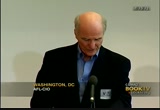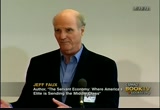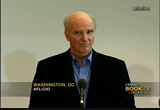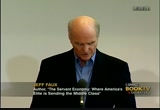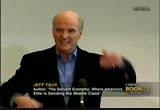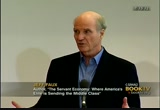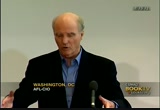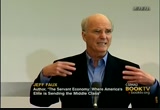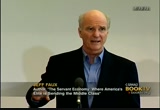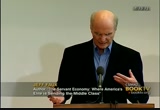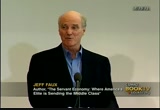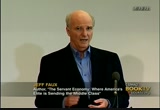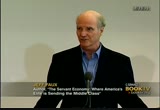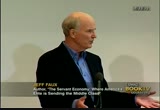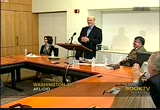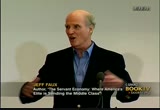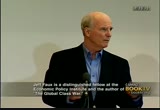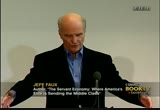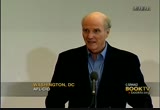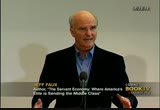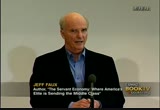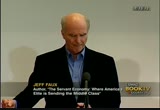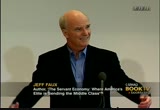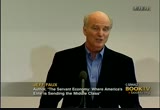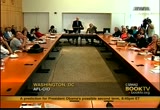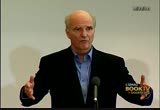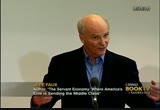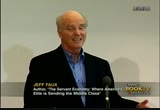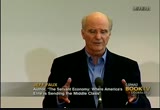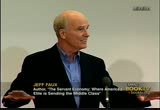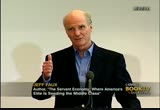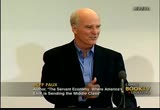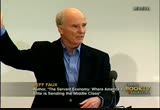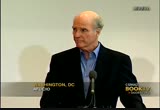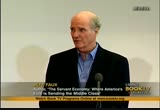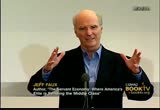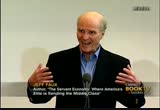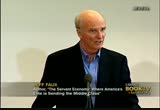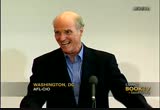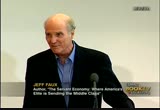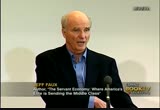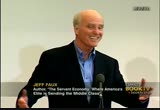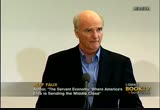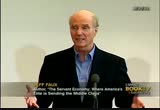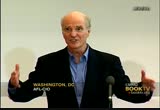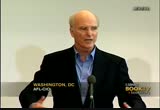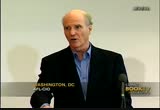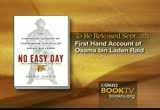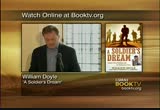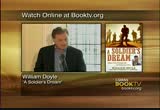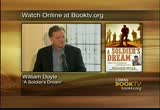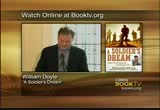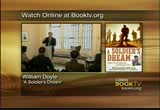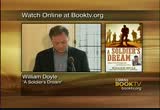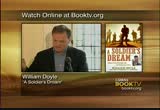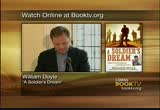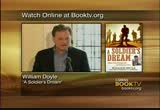tv Book TV CSPAN September 8, 2012 7:30pm-8:45pm EDT
7:30 pm
to be any good. that takes at least an hour pounding it out before i think, oh, here we go. if you wait for that moment to come before you sit down, you won't do it. >> jeff foe predicts a dark future for the middle class in the u.s.. he argues that by the mid 2020s, american workers will see a significant decrease in their incomes and have fewer opportunities for employment as service jobs move overseas. this is a little over an hour, and it's next on booktv. [applause] >> well, hello, everyone, and thanks, rich, for that very generous introduction. i don't know if i deserve it. on the other hand, i lost most
7:31 pm
of my hair, and i don't think i deserved that either. [laughter] in the long run, maybe all these things work out. i'm really honored to be the kickoff speaker for this great series. i think it's a wonderful idea, and i urge you to come back if you don't like what i say, come back next time anyway, and if you like what i say, come back. as rich says, he and i go back quite away, and i was just reminding him that we reminded each other the first time we met was at a cafe in boston with barry bluestone, and we spent three hours talking political ideas, and we have not stopped really ever since. as a matter of fact, last summer when i was still in the middle of the writing this book, i was telling rich about it, and i was talking about the two tier wave
7:32 pm
system, and he said to me, two tiers? why do you think they'll stop at two tiers? good point, and it's in the book. so my book, "the service economy" is about the future. now, it's not about the future of robots a hundred years from now, and it's not about what's going to happen to the stock market tomorrow. the future in the sense of this book is somewhere between 10-15 years from now. now, before i start, i want to make a survey. how many people in this room think that the next generation is going to be financially worse off than the current generation? okay. put your hands down. how many people in this room think that they personally are going to be okay for the next 10-15 years?
7:33 pm
well, for whatever reason. [laughter] okay, all right. okay. [laughter] okay, yeah, assuming -- that was wonderful. well, okay, actually, as i'll explain later, this is a very american audience. i'm going to talk about this in three stages. one, where the economy is headed, mind you. two, what are the chances that that direction will be changed by our current political setup and what that means for activists and people who care about a better future for our country. there's more in the book, of course. there's chapters on history, chapters on america's class system, chapter on why the future disappeared from american politics, and then, of course, as you would all expect in an economics book, there's sex, romance, and adventure, but you're going to have to buy the book to get that.
7:34 pm
now, i start with this proposition. the united states, for a variety of reasons, no longer has the means to fulfill the three great dreams that have driven american politics over the last decade. one, the dream of business and wall street for deregulation and infinite profits. two, the dream of our military and foreign policy elite for global domination. three, the dream of the ordinary american for a rising living standard. now, one out of three? certainly. two out of three? maybe. three out of three? no way. now, you know, you turn on the tv at night, and you read the newspapers in the morning, and
7:35 pm
the pundits and politicians are talking about a grand bargain that must be made between liberals and conservatives, republicans and democrats, about taxes, about the budget, and it's all couched in the future of america. well, my first point here is that the bargain's already made. the deal has already been struck. that is of the three great dreams, the one that's going to go, the one that's going to go is the living standards of the american working middle class. now, this is not as rich said joust about the current recession. for those of you who have been reading the state of working america from epi, you know that at the end of world war ii, wages and benefits in the united states, real wages kept going up year after year after year after year. they peaked in 1979, and since
7:36 pm
then, they have been flat. now, this doesn't mean that no one ever got a raise between 1979 and the crash of 2008. take a typical 30-year-old male worker with two years of college. in 2008, that worker was making no more in real terms than his equivalent back in 1979. by now, we know why. globalization which and a series of trade agreements which favored u.s. investors overseas over american workers, the decline in the bargaining position of american workers, union and non-yiewn notary -- union, and more recently, the cuts and shredding of the social
7:37 pm
safety net. we know why this happened. there's books, including mine, and thousands of others who explained this. there's a question that normal people have. that is, if wages were flat and the economy was stalled for the middle class, why did it look so good? why in the 80s and the 90s, yeah, there's ups and downs, but people, you know, flock to the malls, bought cars, bought houses, ect. well, there's two main reasons for that. one is family income as opposed to hourly wages kept up because families sent more people to work, typically, the wife. well, that strategy is exhausted. there's more women in the labor force than men. the second reason was, i'm sure you all remember, the debt boom, the credit boom.
7:38 pm
your wages were flat. you weren't quite doing as much in terms of earnings as your parents might have been, but you had access to easy credit. well, after the crash of 2008 and 2009, that bubble has burst. it will be at the most optimistic a generation before the public, investors, and everybody else forgets about what happened a few years ago and creates another kind of credit balloon that would lift the economy. a generation if ever that i argue in the book that i don't think is coming back. so you had flat wages and you had props on the family income, knock the props away, and you can expect we're looking at a future of lower and lower wages
7:39 pm
and benefits. even with the recovery, i want to stress this, even with the recovery, even with the recovery of jobs. we will create more jobs in america. we're already creating them right now. they are paying $10-$12 an hour, not $20-$30 an hour. make the optimistic assumptions about the next ten years. no new recession, europe doesn't go down the tubes, no big banks fail. we continue to grow. make that assumption, and you still are looking down the barrel of lower and lower wages, not flat wages, but now i'm talking about a decline. now, nobody knows the future; right? if your boat is headed towards
7:40 pm
the rocks, and there's going to be no change in direction, it is a reasonable conclusion that we're heading for disaster. that is part of what i'm telling you. still, it's not inevitable. we know what we need to change this direction. people have been riding and talking about a high wage strategy for america for at least 20 years. we have a whole literature that explains how america can reverse this downturn. you know it. it's invest in infrastructure, education, and research. it's trade policies that encourage people to make things here in the united states. it's labor law reform. it's regulation of wall street. it's taxes that redistribute. yes, redistribute wealth. it's a true national security strategy that is not dedicated to global empire.
7:41 pm
now, having said that, ask yourself what do you think are the chances of the things i just listed happening over the next four years, eight years, 12 years? just to ask the question is to answer it. now, to get it out of the way. i'm a democrat. i voted for obama last time. i'm voting for obama this time. when i look at the other guy, there's just no choice. i mean, the republican party, and i'm not telling you anything you don't know, has become an instrument of reactionary -- worst kind of reactionary politics. it's not so much about mitt romney. whatever your judgment about whether he's a good guy, a bad guy, no guy, whatever.
7:42 pm
[laughter] but think about this. with the destruction elimination of the liberal republican tradition within the republican party, the people that mitt romney's going to bring into the white house and into the agencies are from a pool of reactionary activists. financial lunatics i mean in some way. the current tax fight where they are defending tax cuts for the top 1% is just unbelievable, but if you want to look into a future of a romney future, that's it. i'm a democrat, but, however, i didn't come here to lie to you. while i think, and i argue in the book that there's evidence that the president understands the central economic problem, and he's proposed some investment programs and thing of that sort, but not nearly enough
7:43 pm
to solve the problem remind you, the country's drowning, republicans looking the other way, the country's drowning 40 feet out, and the democrats throw out a rope that goes 30 feet. either way, it's a downward sloping curve for american living standards. now, i think the last four years just demonstrated that between wall street and the republican propaganda machine and whatever else you think about how the politics works out, the next four years, whatever happens, in terms of the issue of american living standards, i think, are going to be roughly the same at best. after citizens united and the huge corporate contributions
7:44 pm
that are going into these campaigns, both republicans and democrats are more in the pocket of what a friend of mine in texas used to call big dollar than four years ago. again, i'm not saying that there's going to be an economic disaster or cay catastrophe. be an optimist. assume, as all the mainstream pundits want, the democrats and republicans make a deal on the budget, that there is no tax in december, there's tax increases, budget cuts, reduce the deficit, that is not going to stop wages from falling in the united states. on our present course, what do you think the world will look like in ten years? 12 years? well, we got the two tier wave system that will be the three
7:45 pm
tier and four tier system. we got shrinking organized labor. we got low wages, meaning low tax revenue, desperate states and local governments privatizing everything in site. i have an analysis why wall street will own american education in ten years. it's going to be a world in which young people are urged to go to college, get into debt to go to college, but when they come out, what they have is $10 or $12 an hour jobs. 20-somethings, college graduates burdened with debt, working at apple, the best job they could get for $12 app hour. if you ask them, they say, oh, it's temporary. temporary until i get myself back on some professional track.
7:46 pm
well, the 20-somethings are going to turn into 30-somethings, and the 30-somethings turn into 40-somethings. educated, still scrambling, temporary, part time, insecure employment. that is what we are looking at over the next decade on our current path. tensions between generations, not just over social security where young people on low wages start resenting and, god bless them, they have not so far, resenting their grandparents on social security, but on the job, one of the greatest insights on the value of organized labor i ever got was back in the 1970s. i was involved in an effort to revive a plant in ohio.
7:47 pm
i was talking to a retired steel worker, and i said, jim, i said, you know, tell me what it was like before the union and after the union expecting him to say, oh, you know, we got more wages, benefits, i got a vacation. i got health care. what he said, he said, was the fighting between the young guys and the old guys stopped. he explained to me, you know, a steel mill is a -- requires a lot of skill, and before the union, the old guys never wanted to share the skills with the young guys. why? because as soon as the young guys who were stronger, and, you know, all of that, learnedded the skill, the boss would fire the old guy. it's about seniority; right? he said when that changed, suddenly people worked together. suddenly people were happy to transfer their skills and say, well, this is how you work with
7:48 pm
this molten steel model and stuff like that. now, think of a world that no one in this world has ever known, really, where what we take for granted will disappear, and it's not just wages and benefits, but self-respect and dignity. back to pre new deal relations on the job. the boss always has the upper hand, but since the new deal, it was a hand rather than a fist. laws, unions, protections. as they get peeled away in this age of austerity, in this age in where our economic strategy is low wages, if they get peeled away, the speedups get faster, the cheating on paychecks gets more, the cut back on safety. there is no -- i mean, rich's question to me, why do you think
7:49 pm
they would stop at two tiers? why do you think they would stop at any of this stuff? we see it in front of our eyes. people desperate for jobs, bosses unrestrained, things we take for granted like a clean workplace, being able to go to the bathroom without asking your boss, just minimum respect for human beings. that is what is at stake here as we look dwown the low wage future. labor contractors, the service economy turns to the servant economy. now, at this point in my talk, i feel like the woody allen character in the movie who says to the congregation, brothers and sisters under one hand, we have certain catastrophe. on the other hand, we have inevitable disaster. let us pray that we have the wisdom to choose between it. [laughter] well, let me try to crawl out of this abyss now. [laughter] james baldwin, a great american
7:50 pm
writer, said once or wrote once that not everything that is faced can be changed #, but nothing can be changed unless it is faced. that really is my message here and the message of the book. we've got to face what we're headed for, face the gravity we're headed for. face there's no private solutions. now, like you, most americans think that while the country is headed downward in terms of the next generation, they are going to be okay. now, this is traditional american on optimism, and, you know, actually when people do the focus groups, push, you know, it's, oh, hey, well this is america. i'm always going to be okay. well, they are not going to be okay. we are not going to have a majority of americans sitting on
7:51 pm
little islands of prosperity while the whole country goes down the toilet. that is not going to happen. as i say, the 20-somethings become 30-somethings, and the 30-somethings become 40-somethings. hope is not a strategy. just electing democrats is not going to solve the problem. those of you old enough to remember bight was -- bill clinton was the man from hope. president obama had the audacity to hope. hope, when you sort of peel away what the strategy is is what we are left with. it -- hope really means leave it to the market because for a variety of reasons, the government is not going to reverse this trend. leave it to the market, and if you read the business price
7:52 pm
carefully, you'll see some of these hot stories like there's a facility employing 100 people that's come back from china. can you imagine? right? i mean, what am i talking about if we are taking jobs back from china? what they don't tell you is the jobs used to pay $25 an hour, and now they are paying $12. so we are going to create jobs. the question is can they support a middle class living standard, and i think by my formulation, the answer is no. we got the ceos, president of ge, that brought back that water heater, head of the president's advisory council on exports so it's make me stop offshoring. lower your wages.
7:53 pm
that's the message. now, again, this is the strategy. now, conspiracy theory, it's by design. if you have the theory that most people in high places are not so smart, it's by default, but our economic strategy is to create jobs now by lowering wages. there will be no high wage strategy in my opinio given the current political set up unless we start -- unless we not start -- unless we get rid of the tsunami of money coming from corporate america in our politics. if we do not do this, all of the books i've written before, all of the things that all of us have said, the great work of state working america, which lays out what we need to do,
7:54 pm
forget about it. it's not going to happen when big dollar continues to call the tune and, as you know, it's out of control. it's not only about buying up government, but it's also about discrediting government. at the same time that they buy it up, they make sure it's not working for most of the people. big surprise. people don't trust government. duh. of course they don't trust government. now, of course, we know that we need government in order to solve the problems this country has. this, by the way, for those who didn't get it, is a big country; therefore, we need big government. we are not going to run this country. with a government the size of
7:55 pm
hundred dure rase, and yet what's on the television that you turn on and the blog is that nobody trusts government so that's not a solution. i vowed when i started to write this book that i wasn't going to have a last chapter that said here are my six points, ten points, eight points. i've been writing six points, eight points, ten points for 20 years, and then is suddenly downed on me that people were not accepting my eight, ten, and 12 points. [laughter] i have one point at the end of the book, and that point, i had to have some uplift; right? i couldn't leave people in the dungeon. that point, which is -- happens to be something i really believe -- is that we need a national mobilization for a constitutional amendment to finally, finally get rid of one,
7:56 pm
the legal proposition that money equals free speech, and, two, that corporations are people unless we get rid of that, i can tell you, it's going to be slow -- the decline is going to be slower under the democrats, and a little more hue main. it's going to be sharper urn the republicans issue but that's where the cards are laid, and that's where we're going unless we can make a change in the way government operates. now, i believe a constitutional amendment is only one route. we could spend the next three hours arguing about this. i think that public financing really doesn't work anymore. i mean, we got the two president reel candidates who have -- presidential candidates who have blown that off, and the proposition that the solution to corruption in the government is
7:57 pm
for you, mr. and mrs. taxpayer who can't pay the represent and can hardly put food on the table, is for you to pay for the campaigns of people who are too corrupt to trust. that, i think, is a non-starter. oh, but a constitutional amendment is too complicated, says the political smart guy. people don't care. well, it's true because th issue has been what they used to call a goo-goo issue. good government. who cares about good government? you know, a few liberal professors, but we need -- it seems to me to connect the dots here -- to connect the dots for the american people between the way money dominates everything now in our politics, and their future.
7:58 pm
as long as big money calls the shots, and it's getting bigger and bigger and bigger, the servant economy that i describe in this book is inet -- inevitable. again, the pundits and polls are obsessed with grand bargain, liberals and conservatives, make a deal over taxes and make a deal over the budget. the deal is already been made. at least the first two dreams will be preserved. the price will be the crushing of middle class dreams. so, you know, just leaving this now with a little antedote from the book. i was not going to tell you too much about the book because i want you to buy it, but i will tell you about this. as the story of the farmer -- i used to live on a farp in maine, and the story's about the farmer who -- if you ever know anything about a little farm, if you are raising pigs, what happens is that the big pigs, when you put the feed in the trough, tend to go into the trough, cover the
7:59 pm
trough, and eat up all the food. the farmer's got this problem. he asks his conservative son who he sent to a conservative university to say, well, how will i solve this? the conservative son says, dad, you know, that's just the way of the world. it's social darwinism, dog-eat-dog. you can't do anything about the little pigs. feed the big pigs, and little pigs, if they can't get the food, they die. that didn't seem like the solution to the farmer. he invested in all of the pigs. he asked the son who went to the liberal college, and the liberal son says, what you do is you just buy more and more feed, so much feed so that it overflows the trough and the little pigs can get what the big pigs can't possibly eat. he called that trickle down. [laughter] the farmer says that costs a lot of money. i can't afford to do that.
8:00 pm
in test praition, he turns to his daughter who didn't go to college. he explains the problem to his daughter who looks him in the eye and says the answer is get the pigs out of the trough. [laughter] my message is until we get the pigs out of the trough, the servant economy is our future. thank you. [applause] ..
8:01 pm
it takes a while for me to write a book. ski ask me my name is marion with the solidarity center and i have been overseas working for the past 10 years and kept expecting that when i would come home that american were going to be mad and senior things we all talk about out of time. where they met? what do you have to do to shake everybody up to get them to do something? >> that is a big question and probably everyone in this ram has an opinion about that. in my view, many are mad. but they are not sure what they should be mad about. and anything they get mad at
8:02 pm
each other. with immigrants and the tendency for the working class to fight each other when egged on by the rich and powerful is an old story in american history so that is one thing. second, the propaganda from the right has really blown away number one the real hope, the hope that you can do anything collectively, that is through democratic government to solve this problem. everybody knows how they systematically destroyed that idea. and, ever since ronald reagan i have a thesis on this in the book, the future has disappeared from american politics. the line that i was describing that led to flat wages a night in 79 that was apparent to a lot of people back then and there
8:03 pm
were proposals for economic planning for the future toure five at that time in 1979 people saw that manufacturing was going down the tubes and industrial policy. the idea of planning, which probably you haven't heard in the public discussion in two decades in this country, or maybe three, the idea of planning for the future was something that was embedded in you, the energy programs, they were about shaping the future. we started, for a number of reasons we started to lose that at the beginning of the 70's and then we completely lost when ronald reagan became president. jimmy carter if you remember, had solar panels on the white house roof. carter tried true if the country back in the late 1970s on the
8:04 pm
energy crisis. i have a lot of problems with some of the things that jimmy carter did that he was dead right about this and if we had started on planning for a future back in the late 1970s, we would be over whole hell of a lot ahead of the game right now. and the point on this, the future, i mean the past our immediate past is just blurred out. we were like the old soviet union when they used to have the 12 leading guys and suddenly there are only 11 leading guys. it has been photoshop out of our recent past. back in the time of the bicentennial in this country, 1976, 200 years, there is a whole flurry of things around the country about planning for the future. it was like, what would we like our community to be like in the
8:05 pm
year 2000? this was 1976, and some of these things such as the chamber of commerce boosters and some of it was about land planning. some of it was about race and poverty. but it was a conversation that americans were starting to have as they could see the signals that things were not going quite right for america. this was the 1970s. the energy crisis staring us in the face. and this is not just among the grassroots there were big businesspeople. i have quotes in the book saying you know this is commonsense. we need to plan our future. when reagan was elected, rip the solar panels out of the white house and more importantly, photoshop the future out of our
8:06 pm
future. it was not -- the future was not going to be shaped by government. it was going to be determined by the market. and that mindset you know has been reinforced in the echo chamber of our politics. so people are confused about that, but they also don't understand or understand is the wrong word. they also don't see the importance of working together collectively. you see when the show whole show is the country is going to hell but i'm going to be okay it tells you there is a disconnect there, right? in people no longer, and the connection was made, the connection was made by the new deal between the future, the collective future and you as an individual. well, that is gone. and so, we end up with, we end
8:07 pm
up just with frustration, and a distrust that government could possibly be the solution. and yet, this is where he come back to the market, 75% of the american people in one poll, and it's reinforced by others, believe that money buys boats and cars. 81% for democrats and 71% of republicans. i mean you know, you ask about the tea party people. the government is paying off my medicare, right? there is a confusion out there, and i think for one my contribution to this is that i think people have to be forced to face where all this is going, but it's not just going to be
8:08 pm
okay. it's not going to be like it is now. hey you know if the employment button. we seem to be doing okay. it's not going to be like that. it's not going to be two tiers, it's going to be three tiers and four tears and all the things we have built up over the last seven decades, protections for people who have to work for a living which is the majority of americans, they are going to the road fast under the republicans, a lot slower under the democrats unless we change that. >> i might moller. i remember in 2008 eric cantor said that while this was a really dire situation we have all this opportunity that emerged and so.
8:09 pm
[inaudible] i was just wondering in your view, what is the opportunity given the current market? >> well, you know the bad news. the good news is i think it was lester thoreau who when we first started said epi one day said if all the labor unions disappear tomorrow, the day after tomorrow we have to re-create them. so the problem is not going away and trade unions and the solving of that problem will always be somewhere but you know if you go to the history of the great depression, it said quite a while for labor to come back. back in the early 1930s the afl-cio was losing something like 5000 members a month. it was just a bleeding all around.
8:10 pm
the good news is the problem won't go away and probably in some bizarre sense get worse but the second is that i think that a majority of the american people if you look closely at all of these polls, they are not in the tea party. they are not blind to it. they understand what social security does and they understand what medicaid does for them. and so that message has got an audience. the problem is and here's the hard part, and i may lose half the audience. here's the hard part. the problem is we keep promising that if you just elect democrats things are going to be okay so we elect democrats and things are not okay and so, what else have you got? and i think we have got to have something else.
8:11 pm
and as i said i'm going to vote for obama but man, if everybody in this room, if everybody in the shams spent the next three weeks after that rejoicing the week that we want, we are in more trouble than i thought. this is a cliché on the left but we all know it's true. it's about the people's movement and i think it strange at best it may seem to some of the political consultants, i think that the money issue is a winner for us. first of all it teaches the lesson, the lesson that we want to teach them which is that it's the big money that runs things. it's not oh the left-wing ideologue, the guy from the cato institute and the guy from the policy institute you know, what is running it is the money and people get it. if you ask why congress is
8:12 pm
corrupt, what is it that corrupts congress? it's not all campaign contributions. you can corrupt congress by promising a job to goldman sachs after they leave the congress and getting their kid into some private school, you know. there are a lot of ways but nothing beats money for your campaign because if you don't get elected, then you don't have the goodies to give out and you don't get the goodies. it's simple. it's not hard. it's not like here's my health care plan. get the money out of the pockets of the congressman and the candidates. so i think it worked and i think even if it takes a while for it to ever happen, it is a fantastic organizing device. you have got it organized in every state.
8:13 pm
it's not to to sign up here and send a letter to your congressman. it's organizing here to get the constitutional amendment passed. and it boggles my mind over the last 25 years with the equal rights movement, the right-wing, they have a constitutional amendment on abortion and they have got one on flag burning and they have one on and they have one on this and one on that. i have to say this, the constitution as is there document to map. that should be our constitution. >> i saw a film or tv presentation and an article that you wrote about how i guess it was the future powell director and anyway you can correct me and 71 who wrote a document
8:14 pm
saying the socialists have wrecked the country and we have to take it back. they are vastly up fronting for the guys across the street at the chamber of commerce. they brought the national association of manufacturers into d.c. and they drafted a program of how to get from there to where they wanted to go. at the same time the people around the coke family -- koch family funded a lot of the right-wing put together something called al e. maxie. american legislative executive executive -- and they came up with a way to go through state legislatures to do the same thing and so now we have the first of the two four-year attacks on the little
8:15 pm
guy and they have got money and the only thing i can say is yes, take away the money but they are still organized. >> taking away the money is not going to be easy. i quote that memo from powell which was through the chamber of commerce. yeah we know they are organized and so we have got to out organize them. we are not going to outspend them. we are not going to outspend them, no way. if there is any dream that somehow citizens united will make it equal for trade unions versus the big money, forget it. for some people it's liked oh my god, it's just too hard but remember the story about the
8:16 pm
drunk under the streetlight. looking for the keys and the cop said where did you lose them? he said over there and it made my car. why don't you look there? there is no light there. the light is better here if we spend our time on this issue or that issue which is very important, but this is the root. [inaudible] let me start you off on the idea of the future where constructing at an idea of the future by means of political education. it's a great idea among other
8:17 pm
things for continuity spiritually and materially. i am old enough to remember the newsreels when the united autoworkers voted for its first campaign which was to get union rights for gm. when the gm management capitulated thanks to governor murphy and others, the workers poured out the factories that they had been occupy a caring american -- that is to say they had. [inaudible] and one of the interesting perversions of national tradition by the conservatives is that the idea that the united states is in a struggle and i don't know what they call it virtualizing these movements, and obsession with liberalism in
8:18 pm
the form of the constitution so it seems to me that one of our long-term path is to develop a notion of a common future, a future we can all somehow work by andy future that can take the institutional form and you are quite right about this. it's something a historian will have to write about. somehow the idea dropped out of sight. phony notions of liberty. but you are really on the track and i hope you continue it in your next book. >> well don't wait for my next book. [laughter] the adjective long-term, i mean i don't think, i think that too
8:19 pm
often is okay we have to do these things now but tomorrow never comes, and part of my book is about gaining the future, the idea of the future and why i stress now this negative past is to get people thinking about so what is the consequence of all this, and at the consequence is now the props are off. to make a statistical point the props are all family income. it is almost inevitable that it's going to go down unless some miracle happens. you know we always hope that again it's not a strategy and i think that bringing the future back to our rhetoric -- what do you want your country to be like 12 or 15 years from now? what do you want your family to be like? where are you going and
8:20 pm
identified with that which is embedded in america. that is in our psyche and in everything, instead of the false optimism of everything is going to be okay which is now its like people are waiting for the recovery. the recovery is here. this is what the recovery looks like. it's here. it's not you know, this is it. let me get somebody on the site now. >> jeff davis. i am just wondering if you could talk a little bit about what constraints -- that say we get the constitutional amendment, what constraints to the global economy and blood opportunities to the global economy in terms of some of the alliances that
8:21 pm
the afl-cio this progressive movement over the past 15 or 20 years for me came this go forward? what i'm stressing about this week is that maybe for the third time in 100 years the fate of the western world is in the hands of the democratic party and if you look at the person, the president it's not really encouraging. i think the message that you have is you talk about international dimensions. >> a little bit. in my last book as you know i talked about north america and the importance of progressive movements, labor and others having connections across the border. to put it simply if you have a global economy and you have got a global corporation you are going to have to have some sort of global labor movement so i
8:22 pm
think that is one. the second is that on the pessimistic side, you know people in washington, the administration, libertarian republicans say oh everything is going to be on the table in terms of this budget thing. military spending is going to be on the country. no it's not going to be on the table in the recent not going to be on the table, you have to go through the budget accounting to know this -- it's not going to be on the table because the policies that drive it are the policies of both parties. bad as the policies of having the united states still be the policeman of the world. i made the present program is to stay in the middle east. i don't know how much we have to go through this that to know if you hang around middle east long enough you're going to get into
8:23 pm
trouble and spend money getting out of trouble. we are moving into latin america. i mean we have got nexa company which for 70 years did not take u.s. military aid. now it's taking u.s. military aid. against what outside enemy of mexico? guatemala? honduras? el salvador? know, against its own people. we are dedicated to both parties. we are dedicated to keeping america the supreme force in the south china sea. now, i invite you to google it and look at where it is. it's pretty close to china, right? and having an objective of maintaining american supremacy there is going to mean spending
8:24 pm
more and more money even if we don't get into a war. but the third is that i think, and that may make another picture of this process about our money in government, i think they are connected. i think one of, one of the things that's true that we haven't gotten into people's heads is that the american corporate elite do not consider themselves american. that was my point in that last book, and so it's still in the minds of most voters, well romney says you can't tax the people at the top because you know, then they will go someplace else. they have gone someplace else and people have to get that, to realize that, that depending on the markets, depending on corporate america to deliver the goods and some ways the way they did in the old days, to put it
8:25 pm
kindly that's not easy. before globalization, while management and labor were at points often there was class war and both needed each other. in the end, general motors needed united autoworkers. henry ford said that union busters said earlier in the last part of the century when the race was $5 in our -- five dollars a day rather. and the guys on wall street said henry are you crazy? you are paying all that money to these people? they said they are doing the work and then i have got to ask somebody to buy a car.
8:26 pm
that is 1912, that is keynesian economics in 1912 and the report was absolutely right but now where your market is your world, where your market is china, you don't have to worry about raising wages in the united states. for people to buy your goods. what you care about is -- not that they are not selling to americans but it's a vastly different thing. 20 years ago i think it was, vice president of ford motor company's, the senator said representing america automobile industry and the vice president ford said senator just wait a minute, ford, ford is not an american corporation. when we are in america we are an american corporation and way and we are in brazil we are a brazilian corporation and when we are in germany a we are a german corporation and you all know that story but that point
8:27 pm
needs to be driven home. it's not about you know, it's not about reversing globalization. that's right, that's here to stay. it's about either america has some economic meaning or it doesn't and if it does, it's about making sure that we are competitive enough and living standards are growing and living standards are growing in mexico. it's a little bit of a diversion but you know that chart that the fbi puts out with productivity continuing to grow and wages flat, the same charge is true of canada and the same charge is true of mexico. so, there is plenty of room here for an expansive and inclusive
8:28 pm
politics, but first you have to get the out of the trough. [laughter] talk into the microphone. >> actually i have a question about, you give a lot of great ideas but i'm wondering what your proposal on a day-to-day -- sounds like around education or a big picture story? a constitutional amendment movement was like -- [inaudible] >> there are people in this room there are professional organizers and, but you know it's like any other campaign.
8:29 pm
the idea i think is so simple and already you have 75% of the people with you. it doesn't seem too hard to me. to have success, to have good success. what it means literally is you have to create a campaign in all the states because at some point you have to get this put through the state. it's not going to happen -- though there are seven -- are fighting for it. obviously choosing one and getting behind that but it requires a very broad coalition of people to get to the point that again whether you are emily's list or the afl-cio, whether you are even a member of this party, that this is an
8:30 pm
issue for all americans. by its very nature it's inclusive. and it's not like you know, here is my program for me. honey and politics is something that we all understand. how it exactly work state today i know. buy me lunch and i will work it out on a napkin. [laughter] anybody else? one more question. yes maam. [inaudible] [inaudible]
8:32 pm
[inaudible] [inaudible] >> you some of the mainstream punditry has discovered any quality. oh you know, did you did you knw that america is not as equal as it used to be and all of that stuff. god, i mean epi has been putting this stuff out for 25 years so now it's been discovered, that's good but there are two things that go on. one is we have class war now. well, and the second thing is, there is this -- the dots are not connected between the money that is not at the bottom and the money that is at the top.
8:33 pm
inequality somehow is organic and it comes out of some odd process. it's in the numbers. well, inequality is not an accident. and when politicians say, and of course they are also afraid of being a class warrior, my god, but when they say i don't mind people getting as much money as they can and being superrich. that's not my problem. i would just like to tax them another .1%. i do mind him being superrich because if they are that kind of the inequality on the economic side you know there's going to be that kind of inequality on the political side. so it's not inequality this little box problem. is embedded in what's going on. the wages that are not being
8:34 pm
8:35 pm
>> i would like to talk a bit about it and ask darren or the audience about any questions on. this book came about as a result of my reading a newspaper article in the summer of 2007 about a young american soldier who is being hailed as a martyr by iraqis and when i read that story i thought, boy that sounds interesting, how did that happen? who is this man? he had died in an ied attack in the man's name was captain travis -- and i had never heard
8:36 pm
such an thing about an american soldier being hailed as a martyr. this happened in the city that was then the epicenter of the iraqi insurgency and in fact, that the military memorial service for patrick and his fallen colleagues army specialist vincent belmonte and marine major meghan shakes an army security offers came in to play their respect to the fallen americans and to offer islamic prayers mourning for them which was a striking scene in the iraq war. i had to find out more about the story and as i interviewed scores of american and iraqi colleagues they came to realize that perhaps his story is critical to understanding america's role of the world stage in the post-bin laden, post arab spring area and maybe even to discover more about what it truly means to be an american.
8:37 pm
the historical impact of what travis and patrick did as a colleague was rather -- patrick and was a key in the iraq war. infect the war began to turn around in mid-2006, once before the famous surge started happening as patriquin and his military and intelligence colleagues helped iraqis launch something called the awakening which was a sunni tribal revolt against al qaeda. al qaeda of course had never really conquered and held a large piece of territory in the world. there were some exceptions, but what happened in anbar province was al qaeda basically conquered the province and they set up a parallel government, sharia law, courts, a parallel ministry even of government and the rule of this version of radical, radical islam or anti-islam i would call
8:38 pm
it was so offensive that the local iraqis rebelled against it and we help them and the awakening was born. the awakening facilitated the surge and both turning points helped save iraq from what was a total collapse and total full scale civil war in 2006 to a different kind of outcome which is still terribly dangerous but was transformed in the last five years. and i first wanted to know who travis patrick and was. who was this man who iraqis said helped shape the course of the iraq war? it was actually born in the midwest and joined the army that day he finished high school which was 1993. he was a devout catholic and christian new happen to believe that, he refused to believe that his religion was right and other religions were wrong. in fact, he studied the koran very carefully and concluded
8:39 pm
that authentic islam was our greatest allies, america's greatest ally and conquering al qaeda and helping to lead and inspire the world and i thought it was a radical insight and it certainly changed my views. heave is fascinated with arab culture, arab food, arab poetry. he learned arabic thanks to the military for over a year. he studied arabic intensively and he traveled to the middle east. kuwait, jordan and plunged into middle eastern culture and he loved it. he became a special forces support soldier and he went to afghanistan in 2002 in the first wave of american soldiers to strike al qaeda and the taliban after 9/11 and he won a bronze star for the troops in combat there. now in 2005 he was assigned to be the tribal affairs officer
8:40 pm
for the u.s. military in ramadi iraq which was, one journalist called it the most messed up place on the year. reporters scampered through the ruins of ramadi and said this reminds me of images of hiroshima and dresden and stalingrad. it was the provincial capital of anbar province and basically the headquarters of the base they were attempting to launch in iraq. right-of-way three things were obvious to travis patriquin and his colleagues. they had to attack the firepower and they they also had to rebuild the shattered local iraqi police force and reach out to the remaining tribal shakes. a lot of them had fled the horror of this and there weren't many left. although he was only a junior officer, patrick and became the -- patriquin launch the awakening movement that helped
8:41 pm
transform the award. i think travis patriquin's symbol not only the americans have served in iraq but the americans who died there and that many americans who help the iraqis tried to build a new nation out of the horror of this war. perhaps the best way of understanding who patriquin was was to hear what the iraqis said about him and what they told me. in the words of the man who created the awakening movement, travis patriquin was quayle in and in this short name and very important role. he was my brother. he spoke arabic and he looked like an arab man. when he came at the start of the awakening we needed someone like him. he was humble and friendly, and he was always helping me. he helped us with weapons and ammunition. he helped deliver food to people who needed help or were in trouble and he defended the women and children against the terrorist.
8:42 pm
he was important in building a rapport between the u.s. and the shakes. one baghdad born interpreter told me patriquin was in love with iraq. he was addicted to the culture and he was obsessed by it. he loved the food in the and the people and everything about iraq and another of baghdad born interpreter told me, iraqis can like you but they love him for a lot of reasons. he had a magical personality and a trustful face. his presence was noted immediately. iraqis love to talk to men with a mustache and he had a mustache, suntan and a muscular body and it looked like an era. his heart was connecting to these people but the average american soldier iraqis -- but they could tell he enjoyed being with his hands as they did and he didn't take it. they thought he was telling them i will do whatever i can to tell you he was genuine. he gave iraqis the most honorable and honest picture of the american people in the
8:43 pm
middle at -- american military in particular. they thought he was the true american heart. and the iraqi born interpreter concluded, my god there is no one in the world who could have formed a close a connection with the iraqi people than travis did. they adored him. a former iraqi air force air force general told me, americans have not appreciated the lesson of what patriquin and his colleagues did. it was a miracle, an absolute miracle, america's not learned the lesson should have. we need people like patriquin in the american military not just for iraq but for all the middle east, afghanistan and pakistan and elsewhere, people who are principled and people who can wind the hearts and minds of the people with their culture and their minds, not their weapons. patriquin thought he had to reach out to the grassroots in iraq, that we could try to do things from the top down because the iraqi government was nonexistent or horribly
8:44 pm
dysfunctional and many american policymakers were trying to force things from a top-down. it was not working. he also thought we should reach out to insurgents. be that we should identify insurgents who are reconcilable and negotiate with them and talk to them and try to flip them over to our side to try to fight al qaeda because the insurgents was very factionalized. and patriquin also thought we had to be humble and show respect to iraqis and deal with iraq on its own terms rather than try to make us more like them -- to make them more like us. that is a tremendous insight for america in the world. he said if you want to stabilize things you're going to have to cut the and deal with the sheiks. sheiks the tar of ariba who launched the awakening and created all of this was some people thought the
166 Views
IN COLLECTIONS
CSPAN2 Television Archive
Television Archive  Television Archive News Search Service
Television Archive News Search Service 
Uploaded by TV Archive on

 Live Music Archive
Live Music Archive Librivox Free Audio
Librivox Free Audio Metropolitan Museum
Metropolitan Museum Cleveland Museum of Art
Cleveland Museum of Art Internet Arcade
Internet Arcade Console Living Room
Console Living Room Books to Borrow
Books to Borrow Open Library
Open Library TV News
TV News Understanding 9/11
Understanding 9/11
